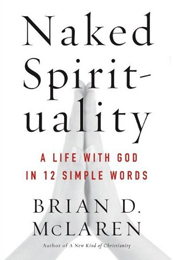 RLC Editor (R): Brian, this book is written for what type of reader – a church-going person of faith, one who has fallen away from organized religion or someone who is skeptical of all matters of faith?
RLC Editor (R): Brian, this book is written for what type of reader – a church-going person of faith, one who has fallen away from organized religion or someone who is skeptical of all matters of faith?
BRIAN (B): In different ways, for all three, and here’s why. First, many people who are involved with the church have felt the bottom drop out: their calendar is full of church activities, but their actual sense of conscious connection with God has evaporated. Second, many people who have dropped out of organized religion are still deeply interested in authentic spiritual practices. And third, many skeptics, if they are going to move beyond skepticism, are only going to do so based on personal spiritual experience. My challenge in writing this book is to seek language that creates common ground for all three groups, and I suppose time will tell the degree to which I’ve succeeded.
R: You write that you want to help readers distinguish the wine of spirituality from the wineskin of the religion it is experienced in. Why are these two things different? Can you share a personal example?
B: Jesus originally coined this distinction: he contrasted his own mission as a new-wine-producer/distributor with that of the religious establishment of his day, implying that they were in the old-wineskin-preservation business. One can faithfully preserve the language and traditions of leaders of previous generations while largely missing or subverting their first-hand spiritual experience and courageous innovation.
For me, I encountered so much of my early experience of spiritual growth in the company of fundamentalists, charismatics, and hard-line Calvinists. From the fundamentalists I gained a great love for the Bible and a fierce determination to put what I found in the Bible above human traditions – including, it turned out, the traditions of fundamentalism. From charismatics I gained a great love for the Holy Spirit, but I learned to distinguish the gentle but quiet voice of the Spirit from the hyped-up, high-pressure shouting of many charismatics. And from Calvinists, among other things, I learned a great reverence for God’s grace and an appreciation for the life of the mind, both of which led me to be suspect of some of the pretensions of many Calvinists I met. In each case, I had to distinguish the precious, dynamic, ever-new contents from the hardening container that delivered them.
R: Many people these days say they are “spiritual but not religious.” Yet you say the real trouble is not with religion, but “de-ligion.” Tell us how these definitions matter in the conversation.
B: I think it’s a mistake to cast “organized religion” as the villain. The problem isn’t organization, which is generally an improvement over haphazardness and chaos. Nor is the problem religion, which I understand to be the rich traditions of spiritual communities over many generations. The term itself means “re-connecting” or “re-ligamenting.” The question is what purpose we’re organizing religious people for. If we’re organizing to create suspicion and fear, religion degenerates into deligion. If we’re organizing “us” to scapegoat and stigmatize “the other, ” again, religion is violating its inherent higher purpose. If we’re organizing to defend the status quo instead of to welcome the incoming and blossoming of God’s will, we’re on an adventure in missing the point.
